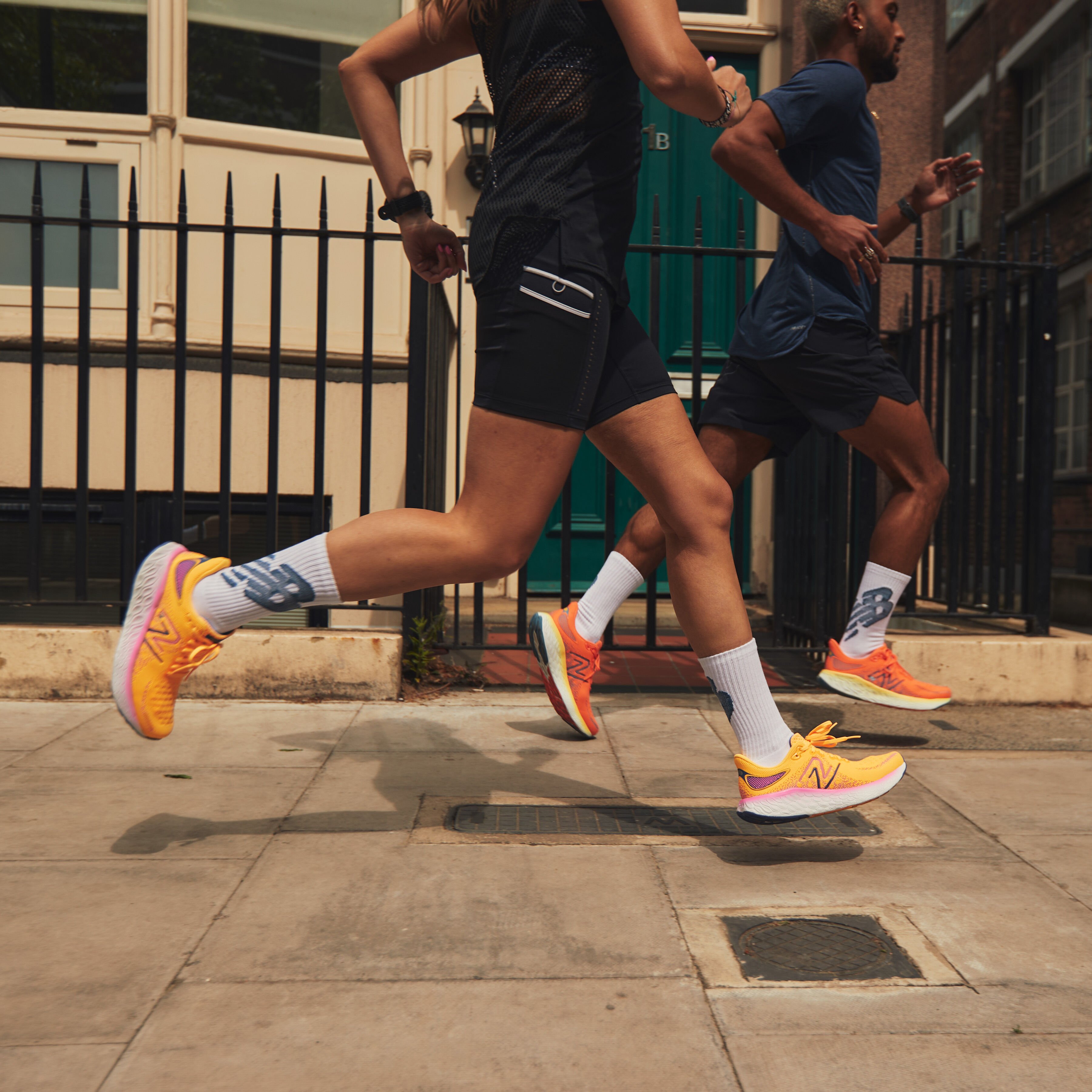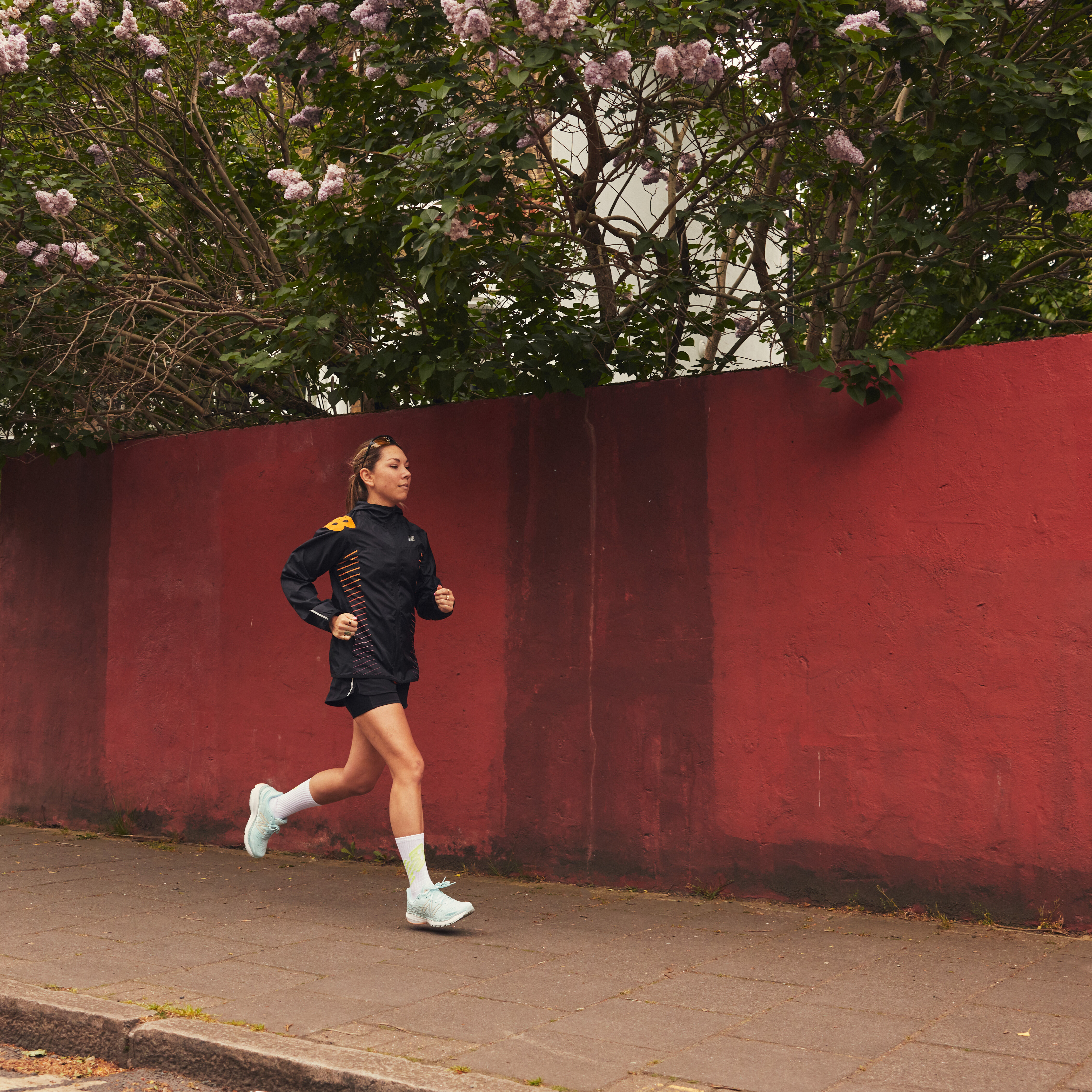
Tips to start running
Whether you’re in your twenties or are thinking of starting running at 50, there are a number of things you can do to set yourself up for success – which we cover in our tips below. If you are over 50, be sure to read the full article, as we have tips specific to starting running when older a bit further down.
Let’s go!
Get some running gear
It might seem trivial, but not having the right running gear definitely doesn’t help with motivation levels. Investing in a good pair of running shoes is a must, but it can also be a good idea to equip yourself with some decent running t-shirts as well as running shorts or joggers.
It’s true, one of the best things about running is how little equipment it requires. But if you’re putting things off because you can’t face hitting the streets in a scruffy old t-shirt and leggings (and where will you put your phone and keys, anyway?), investing in some comfortable, stylish and pocket-imbued running gear could be a really good motivator.
Start by running and walking in intervals – or just walking
If you’ve never run before, you should aim to start out by running and walking in intervals. There are lots of programmes out there to help with this, like Couch to 5K. Or, if you’ve not been exercising at all in recent years, it can be a good idea to start out with a walking programme.
Whether you start out by walking regularly a few times a week, or go straight to walking and running in intervals, the aim is to gradually build your endurance and fitness. The most important thing to know is that it’s totally normal if you can only run for a matter of seconds at first – you’ll be amazed at how quickly you can improve your endurance with the right programme.
Start to run on a regular basis – and stick to your schedule
Creating a running schedule for yourself is a really important part of getting motivated and forming a habit. Set yourself up for success with cues and rewards – for example, one cue could be that you always listen to the same pre-workout playlist, and a reward could be that you always treat yourself to some chocolate or a smoothie after your run. This system will help you form a habit more easily.
It’s also important to think about what time of day is best to do your runs. Sure, movie characters always seem to get out at the crack of dawn before heading to the office. But this might not work for you. Think about when you’re most likely to have the time and energy to actually run, and treat that time as sacred. In other words, you don’t have to miraculously become a morning person to become a runner – it’s important to do your sessions at a time that suits you.
Aim for short, easy steps
When you’re just starting to run, it’s likely you won’t have given technique much thought. That’s ok – getting too bogged down in the technical stuff early on can be off-putting. But to give yourself the best chance at success, aim to take short, easy steps rather than long strides. This is one trick that could make your initial runs that bit easier, increasing the chances you’ll stick at it.
Always start running slow
As you get more confident, it’s important to make sure you’re still starting each run nice and slow. If you go in too hard and fast, you’re less likely to be able to reach your goal – whether that’s to run a certain distance or for a certain amount of time. It’s much better to start off slow, and aim to finish strong, so you don’t end up feeling like you’ve failed.
Don’t run every day
Rest days are crucial for any runner – but they’re especially important at the start of your journey when your body’s just getting used to things. Try a schedule where you run one day then take one day off to avoid injuries.



How to start running at 50
The best way to start running at 50 or older is to simply follow our beginner tips above – but you may want to take into account the extra considerations below, too:
Think about getting a physical before starting out
Running when older can be a brilliant and rewarding experience, helping to improve your health, mindset and quality of life. But if you have any concerns at all, it’s a good idea to speak with a healthcare professional before you set out on your journey. They can advise you about anything that’s worth getting checked over, so you can start your training with full peace of mind.
Consider starting with a walking programme
If it’s been many years since you’ve done any form of structured exercise, it’s a good idea to start out with a walking programme. This will help you build your fitness levels and get your body ready for running.
Add in strength and flexibility training
Older runners are likely to benefit from incorporating some strength and flexibility training into their programme, rather than focusing solely on running. Through strengthening the muscles you engage when you run, you’ll lower your chance of sustaining any injuries, and you’ll also be making things generally easier for yourself.
Best way to start running again
If you’ve been out of action for years or even decades, it can be tough to find the motivation to start running again. But ultimately, the only thing standing in your way – is you! While it might feel disheartening to have to start out like a beginner again, try to remember that you’re human, and it’s totally normal for life to get in the way of exercise and training.
Through practicing self-compassion and seeing starting running again as a fun journey to go on – not a shameful ‘catching back up’ exercise – you’ll be much more likely to get back to it. Follow our tips above to ease in, then look ahead to some exciting future goals, like running a 5k, or simply joining a park run.
It’s never too late to start to run
Running is a low-maintenance activity that can be embraced at any time of your life. There’s no need to walk into a crowded gym, invest in tons of equipment, or even join a class – making it the perfect exercise for those who want to get fit without the fuss. And the beauty of running is that it can be very
gradually eased into, giving your body the chance to get fitter, stronger, and nimbler without too much stress. So, nope – it really is never too late to start to run. The journey starts here.



